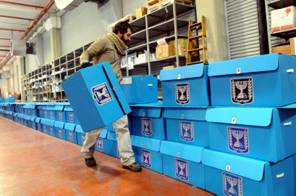UPDATES
Making sense of Israel’s election results
January 23, 2013 | Talia Katz

Contrary to predictions prior to the election by many pundits that Israeli politics is increasingly right-wing, with 99 per cent of the vote already counted the Knesset’s character is looking decidedly centrist, with an almost even split predicted in early television exit polling.
Likud-Beiteinu held seats fell sharply from 42 to a predicted 31 seats, but incumbent Prime Minister Benjamin Netanyahu’s party will still maintain a plurality of seats and will likely be asked to form government. Haaretz‘s Chemi Shalev blames, ironically, the relative success of Israel’s national security measures and the counter productive Likud-Beiteinu electoral merger as probable reasons for the slump in support.
Gil Hoffman of the Jerusalem Post points to off the mark pre-election analysis that misjudged Israel’s move to the right wing. He says that initial polling indicates a clear shift away from the right.
“The polls found that the Center-Left bloc, which won only 55 seats in the 2009 election, had risen to 58-59 seats in the polls on TV. The [Jerusalem Post] Smith poll, which predicted a fight between Kadima and Strong Israel over the last three seats, found that the Center-Left bloc could still win a majority.”
Hoffman also noted that in addition to other mistakes Netayahu was hampered by running against himself, while Aluf Benn of Haaretz blames Netanyahu’s lack of a clear message during this election for the government’s poor showing.
Centrist party Yesh Atid (“There is a future”) was an underreported stand out, claiming an estimated 18 seats to become the second largest party in the Knesset, and the former journalist now leader Yair Lapid is tipped to be asked to join a Netanyahu-led coalition.
Prior to the election, Aluf Benn held a light up to the largely unexamined Lapid, whose local public exposure as a journalist and media figure added to his appeal for voters.
“While the media and the campaign broadcasts were focusing on the battle between Netanyahu and his latest model, Naftali Bennett, Lapid was conducting a focused, quiet campaign that didn’t garner too much attention. His strength wasn’t eroded by feuds, he avoided embarrassing slips of the tongue, and remained faithful to Yesh Atid’s message – “We’ve come to make a change.”
On the left, Labor made somewhat of a comeback as third largest party over all on a prediction of 15 seats but leader Shelley Yachimovich has refused to sit in a Netanyahu-led coalition. Further to the left, Meretz is expected to double in size and take 6 seats.
Despite the intense media coverage of the most prominent personality of the campaign Naftali Bennett, and the forecast success of his far right party Bayit Yehudit (“Jewish Home”), Barry Rubin notes it only received a possible 11 seats, which is
“only about 10 percent of the vote… – which is usual for that sector. In comparison, about one-third [of the vote] went to liberal or moderate left parties, and about one-quarter to centrist parties.”
This is only substantial in the sense that a mere 4% of Israelis are settlers, and therefore the appeal of Bennett came at the expense of more established political names.
Elsewhere, former Foreign Minister Tzipi Livni and her centrist party HaTnua (“The Movement”) garnered an estimated 7 seats, and the centrist party Kadima (“Forward”), formed by Prime Minister Ariel Sharon, fell drastically from 28 seats in 2009 to a precarious and not yet confirmed 2 seats.
The religious bloc is predicted to largely retain its support, with the ultra-Orthodox party Shas on 11 seats and Yahadut ha-Torah (“United Torah Judaism”) up two seats to 7.
Arab parties have gained one representative for an estimated total of 12 in the new Knesset, with Hadash on 4, United Arab List-Taal at 5 and Balad on 3.
For further analysis, the Times of Israel opines that Likud – but not necessarily Netanyahu – is the biggest loser in the aftermath of the campaign, as well as offering further discussion about the right wing swing that never was.
Click here to see the breakdown by party of the current Knesset, elected in 2009, for purposes of comparison.
– Talia Katz
Tags: Israel





